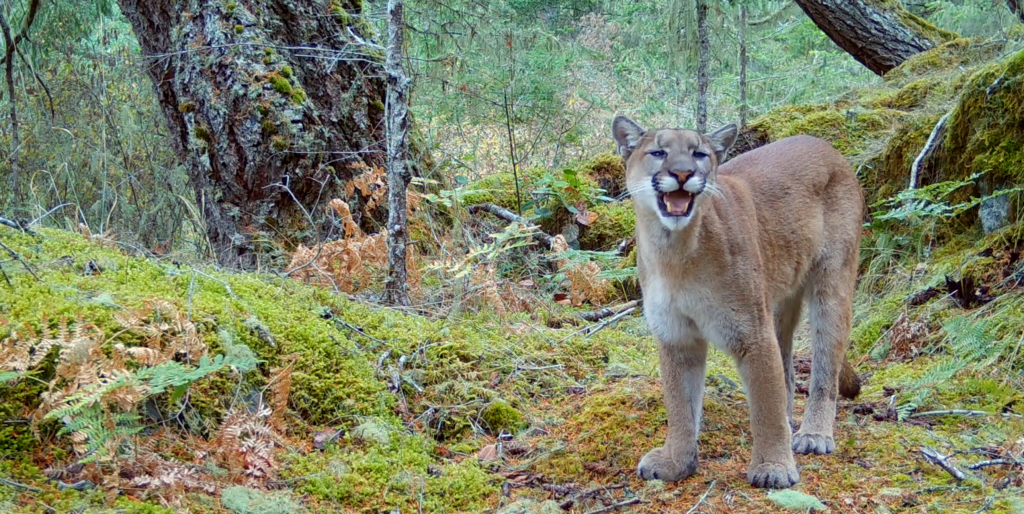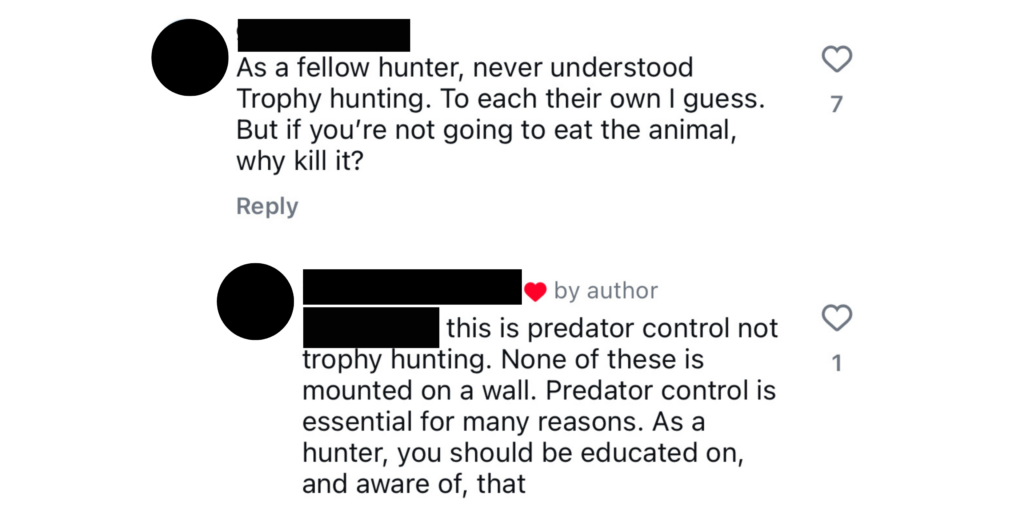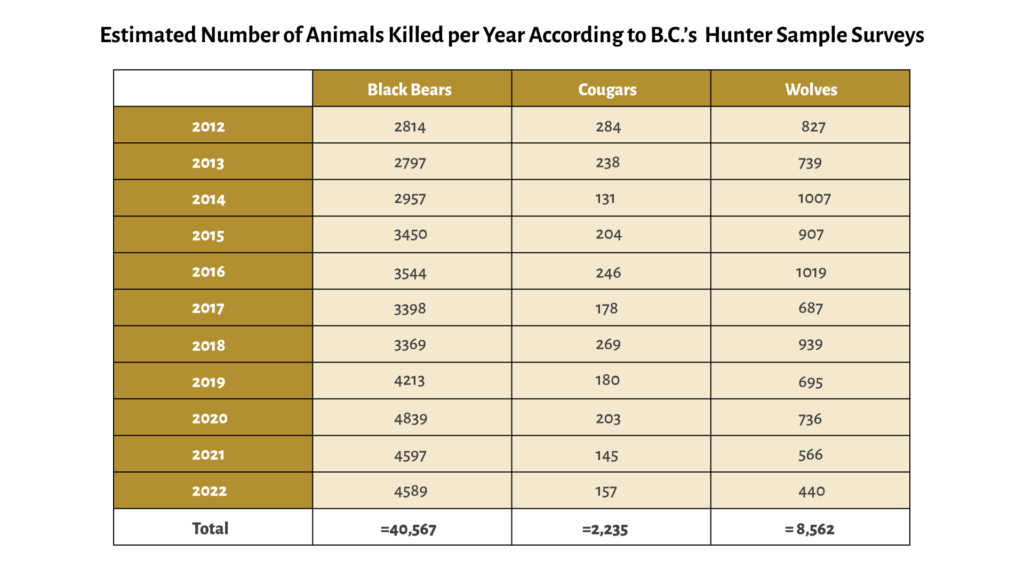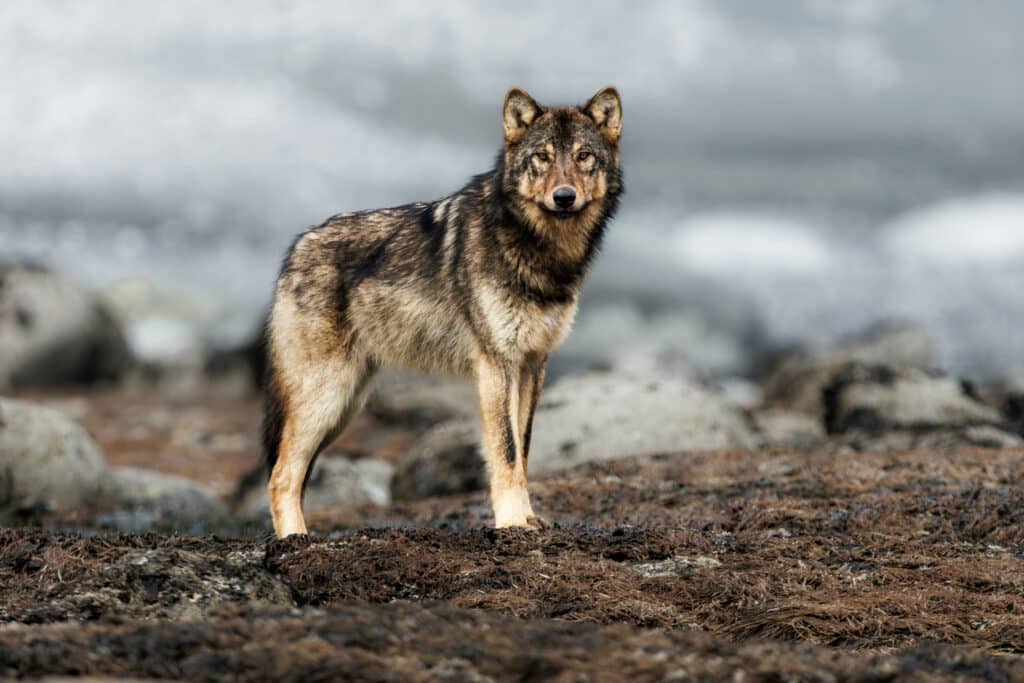Each year, wildlife killing contests take place throughout the province of British Columbia (B.C.), often targeting predators like wolves, cougars, coyotes and bears. Throughout the duration of these contests, contestants are typically awarded points for the most and/or largest animal(s) killed with the goal of winning a monetary or material prize at the conclusion of the contest. To many Canadians, this blood sport is unethical, and has little social licence to operate. As a result, these contests are largely organised in secret among a small subculture within the hunting community. As well, these contests are often wrongly branded by hunters as a “wildlife management strategy” ,namely a conservation measure that prevents natural predators from reducing ungulate populations, so that there are plenty for human hunters to shoot.
Just under three-in-four British Columbians (74%) disagree with the notion that natural predators (such as bears, cougars and wolves) should be killed to decrease competition with hunters for moose, deer and elk.
Research.co
The efficacy of unsanctioned and unsupervised civilian-run predator “management” has very little scientific basis. These contests can have devastating ecological consequences that may take months or years to rectify. Not all hunters support predator “management” and wildlife killing contests. In fact, many self-proclaimed lifelong hunters admonish both practices, expressing concerns that they give the general hunting community a bad name.
Current Contests
The Ungulate Enhancement Program is an annual killing contest organised by the British Columbia Trappers Association (BCTA). For over 26 years, this macabre event has been labelled as a highlight at the BCTA’s annual convention, drawing participants from all over the province to showcase their “talents” in wolf trapping and fur handling. To enter this contest you must be a member of the BCTA in good standing, the wolves must have been killed in B.C. during an open legal season, and only wolves harvested by a licensed trapper may be entered into the “program”.
The structure of this contest is divided into three categories:
- 1 – Random Incentive Draws: Participants are entered into a draw where prizes are awarded randomly, creating an added incentive for involvement beyond the act of killing. The number of draws differs from year to year depending on the amount of funding available.
- 2 – Most Wolves Harvested: This category pits trappers against each other in a race to kill the highest number of wolves within a designated time frame. The more wolves killed, the greater the chance of winning prizes or recognition.
- 3 – Top 10 Wolf Pelts: Trappers compete to present the most aesthetically pleasing wolf pelts, judged based on criteria such as size and colour.
The deadline for this competition was April 3, 2024. Wolf pelts are to be entered at the BCTA’s AGM on April 13, 2024.
The Creston Valley Rod and Gun Club hosts an annual contest under the banner of “Ungulate Survival-Predator Control”. The contest, labelled as a “project” by the club, spans the entirety of the calendar year, running from January 1st to December 31st. Participants are tasked with harvesting specific predator species, with points assigned based on the perceived impact of each kill on ungulate survival. Wolves and cougars, recognized as apex predators in the region, carry the highest point values, with successful hunts yielding a substantial 30 points. Many other species are also targeted,including black bears ( 15 points per kill) and raccoons, skunks, ravens, crows and magpies (ranging in points from 1-3 each).
To be eligible for prizes and recognition, participants must amass a minimum of 50 points throughout the contest duration and hold an active membership with the Creston Valley Rod and Gun Club. This threshold ensures that participants are not merely engaging in deliberate destruction but are actively committed to the club’s purported mission of wildlife conservation and sustainable hunting practices.

The misinformed approach
As deer hunting season came to a close in mid-December 2023, a handful of hunters on Vancouver Island took to online forums with passionate discussions regarding a lack of success with the year’s ungulate hunting across B.C.. Some forum members strongly insinuated that an “out of control” predator population was to blame for their poor hunting season. Others raised their voice to reprimand these same members for blaming predators for their lack of hunting prowess.
At one juncture, a predator derby targeting cougars and wolves was suggested as a remediative measure. There was considerable support both for and against this idea, with one participant recommending the creation of a separate group to discuss the tournament logistics in order to prevent scrutiny of the event.

The online comments that appear on this forum and others show a widespread fundamental misunderstanding about complex ecosystem processes, such as predator-prey relationships, carrying capacity, and trophic cascades. For example, prey populations are often a limiting factor to the growth of predator populations, such as wolves. Population curves for predator-prey populations are often sinusoidal, naturally fluctuating over time. Predators, like wolves, are a keystone species that exert top-down control on the ecosystems they inhabit. In the absence of predation, ungulates may wreak havoc on forest ecosystems by overbrowsing vegetation, reducing the available habitat space for many other animals.
To learn more about the role of wolves as keystone species, read our blog Wolves and the Food Web.
How the province currently manages the hunting of predators
In B.C., provincial regulations governing hunting still apply whether hunters are participating in a contest or not. Hunting regulations differ depending on the species and region where hunting is taking place within B.C.. Hunters are permitted to harvest two black bears and one or two cougars per year, depending on the region and season. Hunters are not allowed to harvest black bears under the age of two years or any bear in their company. It’s also prohibited to hunt cougars with spots (young cubs) or any cougar in their company. A species licence for residents of the province costs $20 for a black bear and $30 for a cougar, a price some hunters have voiced to be unreasonably expensive.
There is no species licence required for hunting wolves and the existing hunting and trapping regulations only mandate compulsory reporting for wolves harvested in Region 1 (Vancouver Island) and Region 2 (Lower Mainland). Reporting is otherwise self-directed by hunters in good faith. The majority of the nine hunting regions in B.C. have no bag limit for wolves, nor do they require data collection by hunters and trappers as a condition of licence. This lax ordinance toward the hunting of a keystone species in our province is extremely concerning.
For other species such as bears, cougars, bobcats, lynx and many ungulates, “The Hunting and Trapping Synopsis for 2022-2024” states that compulsory inspection (CI) and reporting are a mandate under the provincial wildlife act hunting regulations. The CI process may require hunters and trappers to take measurements and submit biological samples of harvested animals for analysis. In correlation with other data collection methods, wildlife managers use the information to set specific hunting regulations. Although this methodology is imperfect in considering allowable “harvest levels”, it is better than the honour system of reporting for wolves.

The provincial government is already heavily invested in the eradication of wolves in an effort to protect declining caribou populations via culling programs in parts of B.C.. Though we vehemently stand in opposition to the wolf cull, it stands to reason that data collection and reporting requirements for these shooters would be an asset to the province’s understanding of populations. .
The province currently does not conduct adequate population monitoring for wolves that would form an accurate baseline of the current size and structure of wolf populations in B.C.. The most recent provincial estimates of wolf numbers were done in 1979 and 1991, over three decades ago. Here, it was surmised that there are approximately 8,500 grey wolves inhabiting the province, 350 of which reside on Vancouver Island and the surrounding coastal island chains. Importantly, B.C. coastal wolves are considered by many to be an Evolutionarily Significant Unit– a set of populations that is morphologically and genetically distinct from other similar populations– that deserve greater protection and special conservation status. To date, coastal and interior grey wolves are managed as a homogenous population unit despite their genetic and ecological differences.
Killing Contests - Cultivating Violence?
Killing contests raise ethical concerns, aside from current “managed” hunts and the overall ecological ramifications. The glorification of killing for sport and prizes desensitises participants to the suffering of sentient beings and fosters a culture of violence towards wildlife. Such contests undermine the intrinsic value of wildlife and promote a utilitarian view that prioritises human interests over the welfare of other species.
“Killing contests” and “predator tournaments” are ongoing in B.C., with recent events being advertised by gun clubs and outdoor stores. Marketing materials use language such as “predator control” or “ungulate survival” to promote contests and continue to award points and cash for killing. Engaging in these kinds of unethical hunting and culling practices under the guise of wildlife management is misleading, unscientific and a violation of public trust.
The Union of British Columbia Indian Chiefs (UBCIC) have described killing contests to be “in direct opposition to Indigenous traditional values, reciprocity with our animal relatives, and our inherent Title and Rights Holders as the stewards of our lands [impeding] on our legal orders and jurisdiction over our territorial lands.”

Sustainable hunting is not a game
A 2022 poll of Canadians showed over 81% of residents are against sport or trophy hunting. While 62% of Canadians support hunting animals for meat, the vast majority of Canadians do not support killing for status, prizes, skins, entertainment and other non-food purposes.
For a province that prides itself on its native wildlife and whose economy relies heavily on ecotourism, it is shocking that B.C. continues to allow these competitions to take place. The provincial and federal governments are obligated to manage and steward wildlife in trust for broader ecosystem needs and for future generations.
Pacific Wild supports ethical and subsistence hunting within lawful practice, supported by the best available science, as well as the inherent rights and titles of First Nations communities to hunt and harvest. In fact, hunters can increase our knowledge and understanding of species, if proper reporting and inspection occur. It’s simply difficult to believe that predator killing contests uphold the standards of ethical conduct with participants competing in a recreational game intended on ending the lives of wild animals en masse for monetary reward and a trophy. Wildlife killing contests have already been prohibited in several US states including Oregon, Arizona, California, Colorado, Maryland, Massachusetts, New Mexico, Vermont, Washington and most recently, New York.
We believe that wildlife killing contests should be made illegal under the B.C. Wildlife Act due to the commercially incentivised and largely indiscriminate killing of wildlife for individual profit. We assert that, as an unregulated citizen-run activity, they have no basis in science, nor should they be promoted as a legitimate wildlife management practice.
use your voice
Send a copy of our pre-written letter to demand an end to killing contests.

